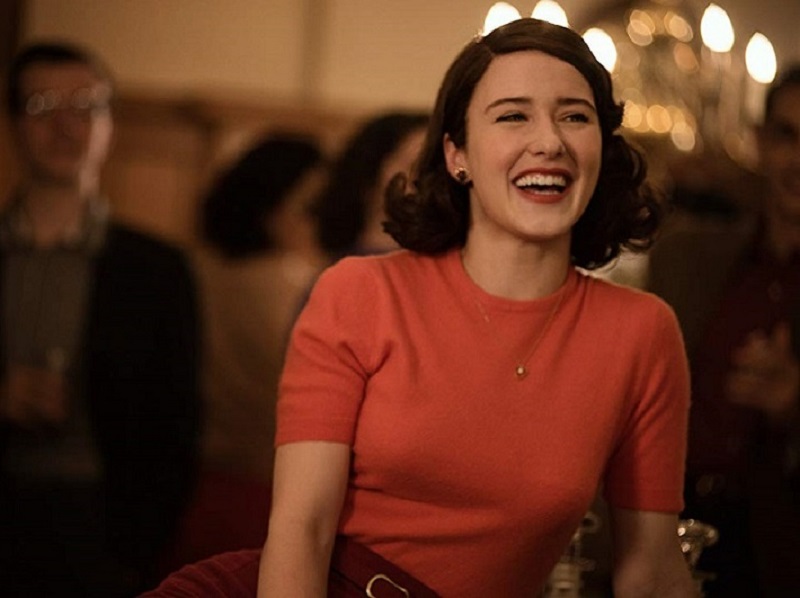Rachel Brosnahan in The Marvelous Mrs. Maisel. Image courtesy of Amazon.
From the outset, The Marvelous Mrs. Maisel does something kind of amazing – it makes stand-up comedy a little bit less awful. I was once drinking beer in the back patio at the Prince O’Whales which has a weekly open mic stand-up night, and this girl turned to me and said “Stand-up is one of two things. It’s either silent. Or it’s bad.” Wiser words may never have been spoken.
I hate stand-up comedy. Occasionally a real talent like Mitch Hedberg happens along who can stand on a stage and do their material and it is both hilarious and not terrible. But he’s an exception, and he’s dead which tells you something about the state of the industry. The vast majority of stand-up is forced and un-funny. And I am talking about even big famous stand-up comedians like Louis C.K. When everyone was sitting around calling him a visionary genius a few years ago for doing 2 minutes of material on masturbating, I saw right through that balding, splotchy veneer and recognized it for what it was - garbage.
Watch any stand-up go on a late night talk show. They just do their material. The hosts set them up so they can just do a few minutes from their act. Rarely do they improvise jokes on the spot, and they don’t like to stray from the material they are pimping. To view joke writing as part of a structured process, the end-point of which is to have material you can take on the road with you and then flog to death, strips comedy of what makes it funny. And the mechanics that go into most stand-up material, the try-hardness, leaves most acts burdened with a flaming sense of contrivance.
And this sordid compost pile is where Amazon’s enormously popular hit The Marvelous Mrs. Maisel has decided to hang its hat. And you know what? It’s really, very good. How does it pull off that neat trick? It clads stand-up in a scaffolding of good writing, quirky character actors, tremendously gorgeous period detail and then makes the stand-up revolve around the personal journey of its extremely likable protagonist – Miriam “Midge” Maisel, played with the perfect amount of charismatic pluck by Rachel Brosnahan.
In this way, the stand-up material doesn’t exist in a vacuum as the manufactured act of some hack comedian. It is deeply integrated with the plot and the characters who inhabit this really engrossing world, and that gives the act so much more depth and meaning – and makes it funnier. Midge derives her stand-up material from her personal life – her husband leaves her, she moves back in with her parents, and she struggles to find her voice as a confident woman amidst the changing social landscape of late 1950s America.
Stand-up is her catharsis, her way of validating her intelligence and her sharp wit after a lifetime of being marginalized, ignored and forced to conform to society’s expectations of acceptable female behavior. Her material is a big middle finger to all that baggage and all her jokes are rooted in things we have seen play out in her life. Thanks to the show’s strong writing and character work, this makes them more interesting and layered to us as the audience because we’ve seen all the little hilarious dramas, ironies, awkward family dinners and turns of bad luck that were their genesis. In this way, the show manages to make Midge’s stand-up more personal and far more enjoyable.
The attention to detail in the period setting is also obviously an important element. Just like Mad Men, it is an immaculate recreation of an imagined past and it completely sucks you in. Sure Midge is a pretty awful, negligent mother spoiled by the trappings of an upper-class existence, paired with an on-again off-again love interest (Joel, her sort of ex-husband) who is an absolute albatross. But all of that seems like so much applesauce because the world of the show is just so seductive, and because the force of her personality makes it almost impossible not to root for her.
Just about every element of this show has been made carefully and skillfully, so it would be hard for it to be bad. But Rachel Brosnahan is a force of nature in the lead role, and I think she clearly elevates the series to another level. Calling your character “Marvellous” in the title card sets a high bar, and she lives up to it. She has a raw energy and power that carries into her stand-up act, but also makes her a compelling anchor around which the series revolves. It’s just one of those lightning in a bottle performances, kinetic and funny and wildly charming. Of course, having Tony Shaloub play her neurotic, ridiculous father is just another out of many brilliant casting choices made by this show.
The Marvelous Mrs. Maisel doesn’t need me to sing its praises – if you’re even remotely aware of major awards shows you’ll already know the show has pretty much won them all. It’s also a strong shot across Netflix’s bow, with Amazon showing it can deliver the goods while Netflix has seriously struggled to produce its own home-grown content of similar caliber.
But for me perhaps the biggest – and most delightful – shock about this series is that it seemingly did the impossible, which is use the tools of the medium to polish the turd that is stand-up comedy and flip the script, turning what in any other context would be a turgid stand-up routine into an act of cathartic, endearing defiance for a supremely well-crafted character. And in the process, the show has somehow made stand-up easy to watch, and actually funny. For that alone, I think the accolades it has collected are well-deserved.

